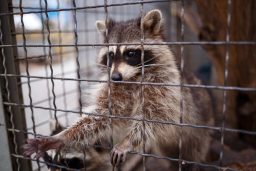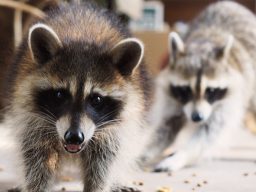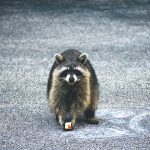In many U.S. states and Canada, it is illegal to kill a raccoon on your property without the correct license or outside of the permitted hunting season.
Are Raccoons A Protected Species?

In most of North America, raccoons are protected by laws governing when and how you can hunt and trap them. There are also many state laws that prohibit the keeping of raccoons as pets in homes or living in sanctuaries. There are also laws on where and if you can release a trapped raccoon too.
Just like most animals in the civilized world – there are rules in place about how they are killed. There are strict laws governing that they must be killed humanely and effectively where they are allowed to be hunted – and rules on numbers of raccoons allowed to be killed by each person or persons. There are even laws regulating where you can use your licensed weapon and the types of weapons you can use.
Therefore, before you start shooting raccoons in your yard – you really need to find out the specifics so you don’t get yourself ticketed. Laws for nuisance raccoons are different – and pest control agencies may be better suited to dealing with single animals. Raccoons can carry rabies of course.
How Many Different Types Of Raccoons Are There?
Raccoons are endemic to North and Central America and are divided up into 22 different sub-species that are all regionally identifiable and so are lower in numbers by the group. If they were all the same species they may well not be protected as much as they are – but due to this restriction of ranges of each sub-species – some to just one state or even just one island (such as the Key Vaca raccoon (Florida); the Vancouver Island raccoon (British Columbia); and the Bahamian raccoon, (Bahamas)) there are rules in place.
Raccoons all come under Procyon lotor – and are all roughly the same shape and colors: all easily identifiable as raccoons. Some however are much smaller and paler (like those in the Torch Key Islands, Florida (P. lotor incautus) and Key Vaca Islands (P. l. auspicatus) and some are much darker and larger (like those in Snake River Valley, Western U.S. (P. l. excelsus).
What Are Some Effective Methods to Deter Raccoons Without Harming Them?
Scaring raccoons away naturally can be achieved through various effective methods that deter them without harming these creatures. One option is to use motion-activated sprinklers that surprise raccoons with a sudden burst of water. Installing bright outdoor lights can also help, as raccoons prefer darkness. Additionally, placing ammonia-soaked rags or commercial repellents around your property can discourage their presence.
How Can You Get Rid Of Raccoons?

If raccoons are the bane of your life and you want to be rid of them in your yard or on your property – you first need an assessment to see if that is even possible. If you are on the home range of large populations or between two patches of prime habitat – it will be a tough ask. Speaking to a wildlife professional will be your best bet.
Generally though, if you aren’t in deep raccoon territory and just get the odd ones in the area – then there are plenty of things you can do to make your own property less attractive to raccoons in the first place – thus limiting the damage they can do and the frequency of their visits.
Protect Your Food:
Raccoons are omnivores – and opportunists. And they are also smart, agile climbers with dextrous hands. Always think of that when storing food in barns, sheds and porches. If a young child could get at it – then so could a raccoon.
Making sure your stores are kept locked, with windows closed and where possible barred – and make sure this is secure at all times – not just at night. If a raccoon realises that they can get at your food during the day – that is when it will come back.
Hide Your Garbage:
Don’t think raccoons are fussy. Your garbage is just as appealing to them as your food stores and pet dishes. All that fresh-cooked food and vegetable peelings are a veritable feast for your local raccoons. They have a very good sense of smell – so can sniff your left-over meat from a few gardens away and will come for it. They also have great memories – and so if your garbage meant tasty food one time – it will most likely mean it again.
Use Strong Smells:
In the same way that strong food smells can attract them to your garden – unpleasant smells can do the opposite. Having the wafting odor of garlic, peppermint, vinegar or ammonia in your yard might make them think twice about coming in at all. If they have the choice between the possible scent of someone else’s garbage – or your stinky yard – they will walk on by.
Just what you want them to do.






